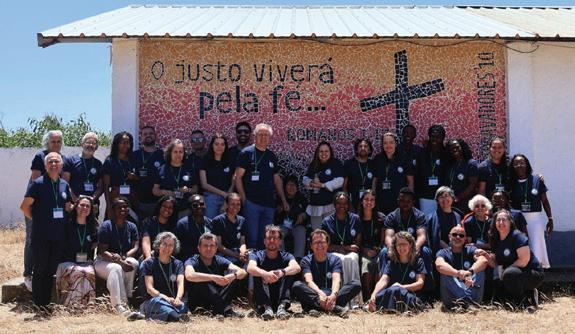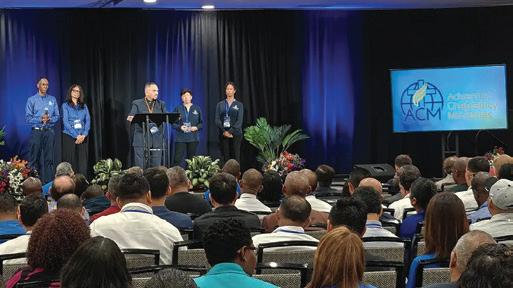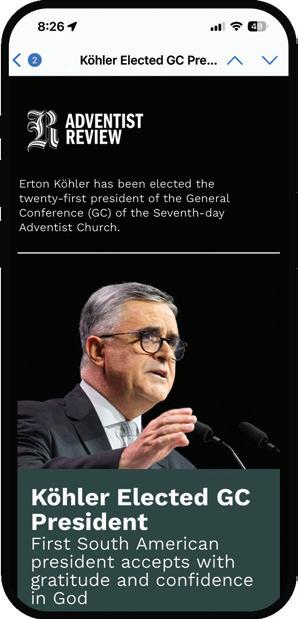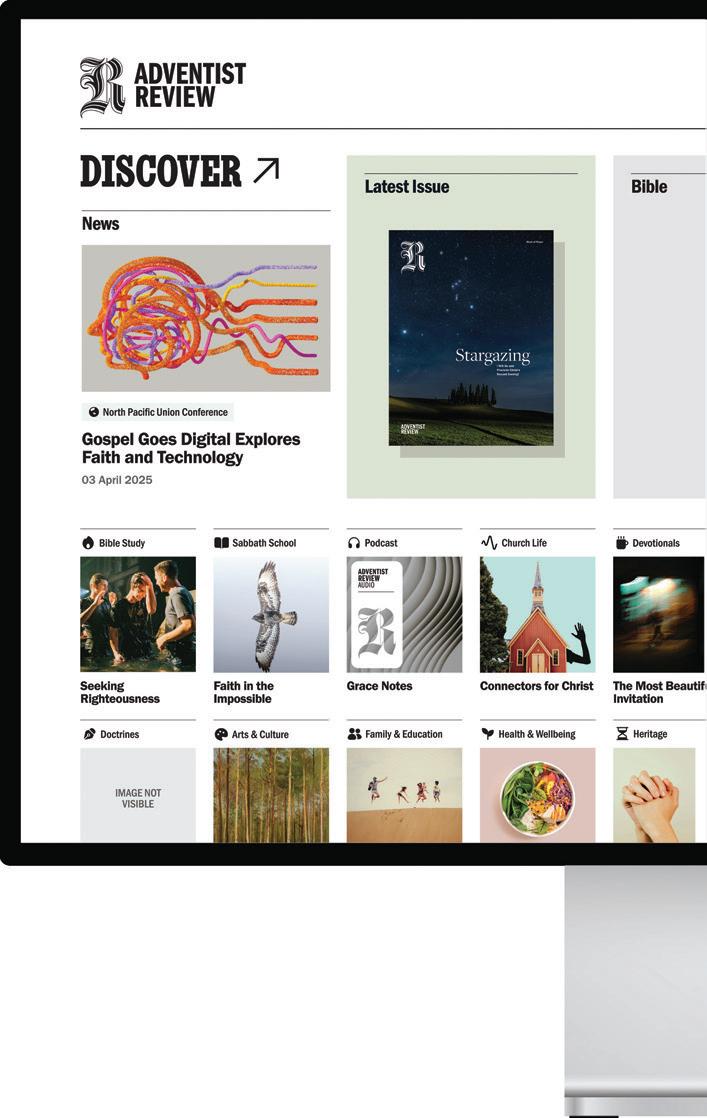ADVENTIST
August 2025

Visit our website, sign up for our newsletter, follow us on social media, watch Adventist videos, subscribe to our podcast, and read on WhatsApp. adventistreview.org/connect

August 2025

Visit our website, sign up for our newsletter, follow us on social media, watch Adventist videos, subscribe to our podcast, and read on WhatsApp. adventistreview.org/connect
In some parts of our wonderful worldwide Adventist Church an innocent tradition of assigning one pastor to one church has taken root. While there are many reasons this model has been adopted (all well intended to provide leadership and pastoral care), it represents one of the most dangerous ideas hindering spiritual and missional growth in our movement. The model leads to pastoral dependency, stunts local church involvement, and undermines the biblical doctrine of the priesthood of all believers.
At its core, the one-pastor-one-church model tends to breed consumer Christianity. Because a pastor preaches every

blamed. What biblical texts support this type of church life?
The New Testament church blossomed through Spirit-led leadership and empowered believers. Paul established teams of elders and trained members to carry the gospel forward. Christ Himself trained 12 disciples not to depend on Him physically forever, but to carry His mission in His absence. Yet in many parts of global Adventism, all spiritual activity is outsourced to one professional.
The church must stop waiting for one person to do what God called the whole body to do together.
Sabbath, conducts hospital visits, administrates, and evangelizes, members become spectators, church shoppers, and Sabbath afternoon analysts of that morning’s program, rather than active disciples of Jesus. The weight of ministry is disproportionately placed on the shoulders of one individual. This bottleneck kills spirituality, creativity, and leadership, concentrating blessing rather than multiplying it. The pastor becomes a performer, and the church, an audience. In turn, the congregation becomes a vestige of the past.
Members rely on the pastor for every spiritual need, often neglecting their own responsibility to serve, disciple, and lead. Some even have their pastors do janitorial work, chauffeuring members in church vehicles, and babysitting youth until sundown. When the pastor is on vacation, the church slows down to a full stop. If the pastor is reassigned, morale dips, momentum is lost, and the local conference is
Worse still, this model limits church planting. Evangelistic outreach, community transformation, and discipleship come to a standstill because they require active congregational participation. Some regions of the church have recognized the lack of growth, yet instead of increasing member involvement, they have increased the number of pastors.
There is a better way. Pastors should be evangelistic equippers, not exclusive entertainers. When pastors are helping a smaller church or planting a new one, members are forced to rise, serve, and own the three angels’ mission. It is fashionable for regions that historically have shared a pastor in a district to “mature” to one-pastor-one-church models. But growth should not be rewarded with a stagnating model. The church must stop waiting for one person to do what God called the whole body to do together.
Some dangerous ideas come from theological liberalism, religious legalism, and secular worldliness. But this one dangerous idea comes from an innocent place leading to one pastor doing it all. Let us reject models that weaken the church; let us grow it. Together.
The number of individuals baptized in a joint evangelistic effort by the Phu Nhuan and the Ho Chi Minh International Seventh-day Adventist churches. The two-day series from June 6-7 was part of the Southern Asia-Pacific Division’s Harvest 2025 initiative, a yearlong campaign that mobilizes local churches across the region to engage in intentional evangelism and community outreach. Vietnam, situated within the 10/40 window—a region where access to the gospel remains limited for many—continues to offer meaningful opportunities for spiritual growth and outreach, regional church leaders reported.
“True inclusion creates an environment where everyone has a voice, a place, and value. This mission reflects God’s love, which desires to save everyone, without distinction.”
– Rainer Wanitschek, director of Adventist Possibility Ministries (APM) in the Inter-European Division, about the first APM meeting in Portugal, which took place in Costa de Lavos, June 6-8. The event brought together people with disabilities, supporters, local leaders, pastors, and families for a moment of learning, welcome, and study. The event sought to promote inclusion and the appreciation of people with disabilities within the Seventh-day Adventist Church, organizers said.

“This building represents more than just bricks and mortar. It reflects our belief in Jesus as the Master Healer and our duty to extend His healing ministry in practical, tangible ways.”
– Ma Rizaline Alfanoso, Health Ministries director at Southern Asia-Pacific Division, about the recent groundbreaking ceremony at Mountain View College, Valencia City, Bukidnon, Philippines, for the upcoming hemodialysis building. The event marked a significant step in the school’s effort to serve the community through quality health care and Christ-centered compassion. The building aims to provide accessible dialysis care, especially for patients in remote areas of Bukidnon and surrounding provinces, where such medical services remain limited.

Jarrod Stackelroth
Erton Köhler has been elected the twenty-first president of the General Conference (GC) of the Seventh-day Adventist Church.
The Nominating Committee of the sixty-second General Conference Session, held in St. Louis, Missouri, United States, recommended the name, which was passed by delegates with a vote of 1,721 to 188 on July 4 during the afternoon session.
Köhler is the first South American president, as well as the second president to be born in the Southern Hemisphere. He replaces Ted N. C. Wilson, who has served as GC president since his election at the General Conference Session in Atlanta, Georgia, in 2010. Wilson has had a strong focus on mission, including initiatives such as Global Total Member Involvement, Revival and Reformation, I Will Go, Mission to the Cities, and comprehensive health evangelism.
Köhler made a short speech when accepting the nomination. “You can imagine how challenging this moment is. No one is prepared for [this]. I’m speechless now. But before any other work, I’d like to tell you that I’ll move forward, renewing my confidence in the Lord and in His church.”
He highlighted a verse his family often uses for Friday evening family worship: Isaiah 41:10, “Fear not, for I am with you; be not dismayed, for I am your God. I will strengthen you, yes, I will help you, I will uphold you with My righteous right hand.”
Köhler used his acceptance speech to express his gratitude to the church, includ-
ing those who “express different opinions.”
“You are part of the family, and we appreciate you, as well,” he said.
Köhler thanked Wilson for his leadership. “Deep gratitude to Pastor Ted and Nancy Wilson, who together led this church for the past 15 years. He’s someone that I learned how to appreciate, how to recognize the integrity of a leader—someone that gives the best of his life to the church. Thank you very much for your leadership, and may God guide your next steps.”
Köhler has served as secretary of the GC since 2021, when his predecessor, G. T. Ng, retired. When originally elected to the secretary role, he vowed to be available, serving with a heart “completely focused” on the mission of the church. “I will be open to [listen] and to learn,” he said. “My job is to build bridges, not walls.”
At the time of his election to the GC, Köhler was serving as president of the South American Division (SAD), a role he had held since 2007. During his time at SAD, Köhler was the driving force behind much of the media growth and the success of Novo Tempo, a 24-hour broadcast on satellite and cable networks in South America. He was the youngest division president to head the SAD at the age of 38.
“We are a global church with a global mission,” GC secretary Köhler said during the GC Secretary’s Report at the 2022 Annual Council. “We cannot focus only on our local needs; we need to look at our global challenges to finally preach the gospel of the kingdom to all the world.” And
he added, “At Secretariat we are working focused on that commitment.”
Köhler spearheaded the Mission Refocus initiative, a strategic plan for the GC Secretariat between 2022 and 2025. Included was a focus on reclaiming missing members, disciple-making, and streamlining the international call process.
Köhler was born in southern Brazil and grew up with a desire to follow in the footsteps of his father, who served as an Adventist pastor. He completed a bachelor’s degree in theology at the Adventist Teaching Institute (now Brazil Adventist University) in 1989 and graduated from the same school in 2008 with a master’s degree in pastoral theology. Currently he is pursuing a Doctor of Ministry degree from Andrews University.
From 1990 to 1994 Köhler served as a local church pastor in São Paulo. He was then elected Youth Ministries director of the Rio Grande do Sul Conference in 1995, and in 1998 became the Youth Ministries director of the Northeast Brazil Union.
In July 2002 Köhler returned to the Rio Grande do Sul Conference to serve as secretary. The following year he was elected Youth Ministries director for the eight countries comprising the South American Division. After serving for four years as Youth Ministries director, he became the South American Division president in 2007.
Köhler is married to Adriene Marques, a nurse, and they have two adult children.
The number of families in Amaluza, Ecuador, that have expressed interest in receiving Bible studies in their homes. This community in the province of Loja, in southern Ecuador is entrenched in religious traditions and hard to reach into. This year’s missionary book is making a big difference. The Key to Change has allowed church volunteers to reach dozens of home with a message of hope, transformation, and faith.
Adventist church members across the globe were asked if they witness to non-Adventists.
Never
Only once or twice
At least once a quarter
Once a month
Almost every week
Every week
More than once a week
N = 145,459
Source: 2022-23 Global Church Member Survey
Data provided by the General Conference Office of Archives, Statistics, and Research
“Mothers are the center. Their faith sets the tone in the home, and their influence shapes the spiritual health of the church.”
– Oyuntuya Batsukh, Mongolia Mission Women’s and Family Ministries director of Mongolia Mission, about an event that brought women together from across the country to empower and equip them for spiritual leadership at home and in the church. The event emphasized the vital role of mothers in passing down faith to the next generation. A total of 101 women attended in person, while more than 70 others participated online. The multiday event featured inspiring messages from mission leaders, interactive workshops on parenting and guiding wayward children, prayer sessions, and meaningful fellowship.
The number of attendees at the recent 2025 Adventist Men’s Rally organized by the West Kenya Union Conference. Under the theme “Transformed by Grace,” the event served as a call for spiritual renewal, godly leadership, and community transformation, organizers said. A major highlight of the day was the graduation of 1,270 lay members who completed a course on Christian discipleship. The event was more than just a gathering, organizers emphasized. “It was a defining moment of recommitment. It reignited the spiritual mission of thousands of men across the region and commissioned them to live with humility, strength, and unwavering faith,” they said.
Do you want to keep up with what is happening in our church? If you want to receive our weekly newsletter that features news, inspirational stories, videos, and more, sign up today.
Event in St. Louis, Missouri, connects hundreds of chaplains and their spouses.
The Fourth Adventist Chaplaincy World Congress officially opened on Monday, June 30, under the theme “A Chaplain’s Response in a World of Crises.” Held in St. Louis, Missouri, the global gathering brought together 482 registered Seventh-day Adventist chaplains and 125 spouses to reflect on four decades of chaplaincy ministry and to address the urgent spiritual needs of a world in turmoil.
In his opening presentation Ivan Omaña, director of Adventist Chaplaincy Ministries (ACM) at the General Conference (GC), established the event’s spiritual tone, calling the attendees’ attention to growth and steadfastness. “Your leadership, your dedication, your tirelessness, and your advocacy as chaplains and ministers have made this global gathering possible. The growth of this ministry over the past four decades is because of your mentoring and your belief in our chaplain ministry,” Omaña said.
He then turned to the pressing realities facing the global community. “We gather at a moment in history when wars rage, political divisions deepen, economic uncertainty looms, and personal suffering intensifies, from refugee camps . . . to overcrowded emergency rooms, from correctional institutions to university campuses. Crisis

is no longer the exception. It is the norm. And into this storm, my dear chaplains, God has called you and me to be His living presence,” he said.
He called chaplains to serve with competence, commitment, and compassion, drawing inspiration from Scripture and the sacrificial service of early Adventist pioneers.
“CRISIS IS NO LONGER THE EXCEPTION. IT IS THE NORM. AND INTO THIS STORM, MY DEAR CHAPLAINS, GOD HAS CALLED YOU AND ME TO BE HIS LIVING PRESENCE.”
The evening featured a devotional speaker, Chaplain Andrew Harewood, who delivered a message based on Acts 20. Harewood testified to the importance of faith, resilience, and spiritual leadership, and challenged attendees to reject passivity and embrace spiritual courage. “Leadership is being before doing,” he declared. “Don’t fight the crows; just keep soaring.”
Harewood concluded with a call that
resonated deeply with the congregation. “We’ve got to be healed before we can heal.”
For the first time, chaplains’ spouses participated in the World Chaplaincy Congress. A special program honored their role in ministry support, including an outreach project on July 1, at Agape Seventh-day Adventist Church, where they distributed essential supplies to tornado-affected residents.
“We wore our blue shirts and comfortable shoes, rolled up our sleeves, and were the hands of Jesus,” said Debra Anderson, wife of retired U.S. Navy chaplain Paul Anderson.
Joyce Johnson, wife of Washington Johnson, Chaplaincy Ministries director for the North American Division, held a seminar to support chaplain families emotionally and spiritually.
The World Chaplaincy Congress also featured worship services, professional development sessions focusing on Clinical Pastoral Education (CPE), trauma care, military ethics, and crisis response. These include new CPE initiatives in Frenchand Portuguese-speaking territories, and testimony and networking events that highlight the expanding reach of Adventist chaplaincy, organizers reported.

Shawn Boonstra

Most of the world’s population will never experience it, but there is a temperature below which snow starts to squeak under your boots and tires. The air becomes sharp, and there are often ice crystals hanging in the air. It’s a silent world, perhaps because –40°C/F has a way of driving most people indoors, and perhaps because regions with these temperatures are sparsely populated to begin
with. Snow has a way of soaking up sound, providing introverts with an ideal world.
Driving under such conditions is far more pleasant than you might expect. Snow drifts into potholes, filling them up and smoothing out the road. Rivers become important shortcuts because they freeze hard enough to drive on. And again, because there aren’t many people, you might drive for long stretches without seeing anybody.
Those long stretches can become boring, however. At one point it occurred to me that I could probably read a book as I commuted. My reasoning went as
That’s the way it is with most of your neighbors right now. They might not mention it to you, but most of them are paying attention.
follows: I have to look down at the gauges occasionally anyway; why not glance down at a book and read a line or two? All you really have to do is place the book high up on the steering wheel and keep the top two corners between the lines on the road. (Do not try this at home; the system completely fails when there’s a moose in the road. I once slid the hood of my van under the belly of a very large bull, stopping only two inches short of disaster. He looked at me indignantly, stepped over my car, and wandered off into the woods.)
At night it became impossible to read. The northern lights were frequently visible, and the shimmering curtain of green near the top of my windshield—seemingly so close you should be able to touch it—would activate my imagination. To keep things more interesting, some nights (if the moon was full) I’d turn off my headlights and drive in the dark: the dark band between the fields of snow was the road. (Again, do not try this at home; I was young and foolish, and it’s incredibly dangerous—if for no other reason than you need your headlights to spot the eyes of the deer waiting in the trees to sprint out onto the road.) If all else failed, I could always listen to the radio to wile away the time. Options in the north were limited—you could pull in only a handful of stations. For some reason I could always pull in a few more on a clear winter’s night. Shortly after midnight on one long, lonely drive, I suddenly discovered Art Bell.

I could scarcely believe what I was hearing: people were calling into the show to talk about very unusual experiences: Sasquatch sightings, alien abductions, government psychological experiments, conspiracy theories. Mr. Bell took every call seriously. “There’s a Sasquatch in my yard right now, and I’m learning to talk to him!”
“Really? Tell me more.”
It was like a car crash on the airwaves; I couldn’t help listening. Over the next few weeks I got an advanced education in conspiracy theory, although I had to turn it off once in a while, because it went places that no faithful Adventist should ever go. If his guest was a psychic who talked to the dead, I was done. Our counsel regarding such things is crystal clear. In some ways the information was useful. At large

evangelistic meetings there were always one or two people who were into this stuff, and they were pleasantly surprised that I seemed to know what they were talking about—and even more surprised that I continued to treat them with dignity. That was part of Art Bell’s success, after all. Sometimes the world does a better job of handling people than we do.
I almost always knew where to start in the Bible with people who had been immersed in such things.
I didn’t listen frequently, of course—it really was confined to those long late-night
drives across the frozen north. But in about the mid-1990s I heard Art Bell start talking about the quickening, a term he coined to describe the angst that many people were feeling about the rapid pace of change in this world. If the civilization felt as if it was coming unraveled, and you were really confused about the future, that meant you were experiencing “the quickening.”
It was a decidedly New Age approach to a very real phenomenon. Most people really are aware that it’s no longer business as usual here on Planet Earth. The world we were born into is gone, and it’s becoming more difficult by the day to explain the world we’ve now entered. From Art Bell’s
perspective, that was some mysterious force reminding you that the world is about to evolve from one state of being to the next. For me? It’s a reminder that Jesus was right on the mark when He gave His disciples signs to watch for: famine, pestilence, earthquakes, war.
”Now when these things begin to take place, straighten up and raise your heads,” Jesus told His disciples, “because your redemption is drawing near” (Luke 21:28).1 I’ve had old friends from my youth ask me why I seem so calm when the world appears to be falling to pieces around us. “It’s because it’s exactly what I expected,” I tell them, “and I’ve seen the end of the story. It’s better than you think.”
When Art Bell started talking about his “quickening” theory, he pointed to the bombing of the World Trade Center—most of us have forgotten about the first attempt in 1993—as evidence that our world was crumbling. Little did he realize how small that event would seem after 9/11 (September 11, 2001). He also pointed to social collapse, the rapid advance of technology, pestilence—actually, just about everything Jesus mentioned. He recognized signs without understanding them.
That’s the way it is with most of your neighbors right now. They might not mention it to you, but most of them are paying attention. The promises of the modern world fell apart in the twentieth century when we realized that no amount of technological advancement is going to fix what’s wrong with the human heart.
The late nineteenth century was brimming with enthusiasm. The mechanization of war and destruction in the twentieth killed that. Postmodern philosophy has put a massive dent in people’s ability to believe in objective truth. And yet—perhaps because God has put eternity in the human heart (Eccl. 3:11)—we still seem to be able to recognize that something is objectively wrong with us.
I’ve watched that recognition in action many times over. In evangelistic meetings I have often started at 9/11 and displayed Time magazine covers from then until now—flashing them in rapid succession

across the screen. The look on the audience’s faces is not fear; it’s relief—relief that Somebody seems to know what’s going on down here, and He has a plan to solve it. Perhaps that’s why Jesus included this thought in His list of signs to watch for: “This will be your opportunity to bear witness” (Luke 21:13). He originally said it in the context of persecution—you will be able to witness to your persecutors—but I have adopted it as a promise for outreach.
Some people point to the collapse of worldly systems as evidence that Jesus is coming soon, and they are not wrong. But if that’s all you pay attention to, you can easily slip into a world of fear. When that happens, you become prone to dwelling on self: how am I going to survive this? It’s an unbalanced and unhealthy response to prophecy that flies in the face of Jesus’ repeated reminders to “fear not.” Meanwhile, we’ve been told that we do not grow in our faith by making prophetic charts, trying to drill down and divine details of the future. It’s not that prophecy isn’t important; it is all-important—in fact, it’s the reason that I’m a believer today. But
how do we grow?
“The only way to grow in grace,” we’ve been told, “is to be disinterestedly doing the very work which Christ has enjoined upon us—to engage, to the extent of our ability, in helping and blessing those who need the help we can give them.”2
It’s not one of the ways; it’s the only way.
And it’s on this point that I see the clearest evidence that Jesus really is coming soon. I’m witnessing an openness to our message that wasn’t there a few decades ago. Yes, the world is falling apart, but at the same time, the Spirit of God is opening doors at an unprecedented pace.
Friends used to be merely polite when they heard I’d become a Christian (and a preacher!). Recently—suddenly—they’re reaching out to me in droves. “What Bible should I be reading?” “What does the Bible say about disappointment?” And, after the pandemic, the Russian incursion into Ukraine, and the October 7 Hamas raid. “Does the Bible say anything about what’s going on in this world?”
I’m now giving Bible studies that I couldn’t have imagined giving just a couple of years ago. The response I’m getting? “I have peace of mind for the first time in my life!” It’s as if a massive door of opportunity has suddenly swung open—and I’m hardly the only one who’s noticed it. I’m under no illusion that it’s going to last forever, because prophecy indicates that it won’t. But while it’s here? Cash in on it. It’s more evidence that God is preparing to enter human history for good.
Years ago I found myself trapped in a small arctic village because of blizzard conditions. I had boxes of Bibles in the Inuktitut language that I’d purchased to hand out, and one Sunday morning I noticed people entering a small chapel. I decided to join them. A kind Inuit woman offered to translate what was happening: a lay pastor stood up with the only copy of the Bible they appeared to have in that town, and began to read from Matthew 24. He ended with “And this gospel of the kingdom will be proclaimed throughout the whole world as a testimony to all nations, and then the end will come” (Matt. 24:14).
He stopped and looked up at my team, wearing bright-red parkas in the last row of the church. “And why are you here?” he asked. They’re not used to many visitors in those parts.
”Funny you should ask,” I said. “We’re here to hand out Bibles so that the end can come.” It was the beginning of an incredible work among one of the last unentered people groups on the planet.
There is a “quickening,” all right. It’s just not happening the way that New Age radio hosts think. Something is definitely stirring: I can hardly keep up with the sudden deluge of requests for prayer and Bible study. It seems as though Jesus really is about to return.
Don’t miss what’s happening. Just don’t.
1 All biblical quotations are from the English Standard Version.
2 Ellen G. White, Steps to Christ (Mountain View, Calif.: Pacific Press Pub. Assn., 1956), p. 80.
As foreshadowed in the type, and foretold in the Scriptures, Christ, at the time appointed, entered the most holy place of the temple of God in heaven. He is represented by the prophet Daniel as coming at this time to the Ancient of days: “I saw in the night visions, and, behold, one like the Son of man came with the clouds of heaven, and came”—not to the earth, but —“to the Ancient of days, and they brought him near before him.”
This coming is foretold also by the prophet Malachi: “The Lord, whom ye seek, shall suddenly come to his temple . . .” The coming of the Lord to His temple was sudden, unexpected, to His people. They were not looking for Him there. They expected Him to come to the earth, “in flaming fire, taking vengeance on them that know not God, and that obey not the gospel.”
Shortly after the fulfillment of some of the signs that the Saviour foretold would be seen before His second coming, there took place throughout the Christian world a great religious awakening. Students of prophecy came to the conclusion that the time of the end was at hand. In the book of Daniel they read: “Unto two thousand and three hundred days, then shall the sanctuary be cleansed.” Thinking that the earth was the sanctuary, they understood that the cleansing foretold in Daniel 8:14 represented the purification of the earth by fire at the second coming of Christ.
Daniel knew. So did Malachi. Are we ready to meet Jesus?
Ellen G. White
Searching the Scriptures for further light, and comparing this prophetic period with the records of historians, they learned that the twenty-three hundred days extended to the year 1844. . . .
But the people were not yet ready to meet their Lord. There was still a work of preparation to be accomplished for them. Light was to be given, directing their minds to the temple of God in heaven; and as they should by faith follow their High Priest in His ministration there, new duties would be revealed. Another message of warning and instruction was to be given to the church. . . .
Those who are living upon the earth when the intercession of Christ shall cease in the sanctuary above are to stand in the sight of a holy God without a mediator. Their robes must be spotless, their characters must be purified from sin by the blood of sprinkling. Through the grace of God and their own diligent effort, they must be conquerors in the battle with evil. While the investigative judgment is
going forward in heaven, while the sins of penitent believers are being removed from the sanctuary, there is to be a special work of purification, of putting away of sin, among God’s people upon earth. This work is more clearly presented in the messages of Revelation 14.
When this work shall have been accomplished, the followers of Christ will be ready for His appearing. “Then shall the offering of Judah and Jerusalem be pleasant unto the Lord, as in the days of old, and as in former years.” The church which our Lord at His coming is to receive to Himself will be “a glorious church, not having spot, or wrinkle, or any such thing,” “fair as the moon, clear as the sun, and terrible as an army with banners.”
Seventh-day Adventists believe that Ellen G. White (1827-1915) exercised the biblical gift of prophecy during more than 70 years of public ministry. This excerpt is taken from Southern Watchman, Jan. 24, 1905.
Jonathan Walter
Don’t cry wolf!” Perhaps you heard something similar from your parents growing up, or maybe you have given your children the same type of warning. For those unfamiliar with the idiom, it means “Don’t cry for help if there is no emergency. Otherwise, people won’t believe you when you are in actual danger.” Don't sound a false alarm. I remember when, after an unsanctioned round of jumping on and rolling around on my parents’ bed, I fell off and slammed the back of my head with full force into the metal edge of an old radiator. Lying on the ground in shock, realizing that blood was flowing from my head and imagining the worst, I cried for help. There was no response. This continued for a short while until I was able to get up and stumble into the hallway toward my mother, who hadn’t heard me because she was dealing with some visitors who were leaving. With blood on my hands, I mumbled something along the lines of “I need to go to the hospital,” and off we went. Thankfully, I just needed some stitches. In this case, the call for help was real. The experience of sounding the alarm but not being heard was, nonetheless, frightening. That moment taught me something deeper: if we sound an alarm too often or without clarity—whether real or imagined—we risk not being heard when it matters most.
Part of being an Adventist includes sounding the alarm about the end-times and the fulfillment of prophecies. And rightly so. We are living in the last days; Jesus is coming soon, possibly and hopefully in our lifetime, and time is running out. Whenever I preach evangelistic meetings and present the signs of the times along with the biblical commentary on the political and religious dynamics of the world, I realize anew the urgency of our reality. Finding the right balance of emphasis, sounding the appropriate type of alarm, and not overlooking the main point of prophecy, however, continues to be a challenge for God’s people.


Unfortunately, some people raise what I would call questionable alarms that can easily destroy our credibility. Let me illustrate. When I was a teenager, a high-profile preacher came to our school and announced that Jesus might be coming in about two years. He based this on the fact that he could not renew various ministry-related business contracts beyond that time, concluding that the end was
seem to have the gift of producing endless amounts of clickbait content, “revealing some hidden agenda” about politicians, religious leaders, actors, and even our own church administrators.
But is this kind of alarmist behavior really helping anyone? Isn’t it mostly damaging to the kind of proclamation we are called to make?
Will people want to listen to us, let alone believe us, when much of what they have
Often we seem more excited to focus on the signs of His coming than on sharing with the world who is coming and why that is good news
near. He also spoke about secret prisons in Catholic church basements reserved for Sabbathkeepers during the final persecution, among other things. Twenty years have passed since that presentation, and although it did scare my half-converted heart and “wake me up” a bit, it did not strengthen my faith or encourage a love-based surrender to God, especially after the projected two years went by and nothing happened.
Another example: Every time a pope dies, it seems a new version of the idea that the deceased pope, or the next pope, would “definitely” be the last one floats around in certain circles. Speculative “evidence” is presented to support the claim. And while one day there will of course be a final pope, just as there will be a final pastor in my church or a final president in my country, conjecturing on this topic is not going to keep a young person in the church or lead seekers to fall in love with Christ.
I could go on and mention the various self-proclaimed YouTube preachers who
heard spoken in our name is speculative, fear-driven, and, over time, proved wrong? I wonder.
Now, is there a “hidden agenda,” a grand meta-level scheme that engages every human on earth to some degree? Absolutely. The devil’s conspiracy to oppose and destroy God and His people is true and very real. It is not a theory; it’s what caused the great controversy. And is Satan, in various shapes or forms, involving people, organizations, and stories to further his (to the Bible student, not-so-hidden) agenda? Yes, of course. And do people need to know about this? Absolutely. But is obsessing over and postulating uncertain details of darkness the gospel? No. No, it’s not.
As a pastor, I have witnessed this repeatedly: members and seekers who build their religious experience and allegiance to the church on the latest sensational headline or claim that fits their curated narrative. That feeling of excitement, of “knowing” what is really going on, is then
often subconsciously mistaken for revival or sincerity of faith. The thrill of the alarm can easily replace the joy of salvation and a Christ-centered walk. Sadly, this kind of focus frequently goes hand in hand with judgmental attitudes, legalistic tendencies, and an inability to be corrected. Yes, we must be watchful (Matt. 24:42), but let’s ground our vigilance in faith in Jesus, not questionable sources. Doing so will transform a fear-driven urgency into a thoughtful, hope-filled awareness. “For God has not given us a spirit of fear, but of power and of love and of a sound mind” (2 Tim. 1:7).
On the other side of the coin are those who, for various reasons, don’t seem to anticipate or desire the last days to unfold in their lifetime, or at least not in the traditional Adventist understanding of it.
more “rationalist” outlook on the urgency of our times, echoing the call of mockers throughout history, “Where is the promise of His coming?” (2 Peter 3:4), as well as the blindness of the Laodicean church (see Rev. 3:14-22).
There is a time and place in our preaching for illuminating the darkness, revealing the reality of falsehoods and diversions in our
sinful hearts, He, the Lover of our souls and Healer of humanity’s fatal brokenness, is about to make His glorious entrance! Not just to save those who believe in Him from the beasts of Revelation 13 and the disasters of Matthew 24. He is coming to bring home His bride, His eternally valued and redeemed friends, and restore them to His heavenly home for unceasing fellowship, joy, and love in holiness and glory!
The thrill of the alarm can easily replace the joy of salvation and a Christcentered walk.
A few years ago I heard a speaker share from the pulpit how he understood what prophecy foretells in Revelation 13, including the coming persecution, but then concluded by saying, “I hope I’m no longer around then.”
Others resort to problematic hermeneutics to discredit established, foundational interpretations of end-time prophecy, including dismissing the relevance of Ellen White’s writings for today’s church. Being diligent, engaged in traditional evangelistic preaching, and focused on our end-time mission is deemed borderline fanatical, legalistic, or outdated and no longer pertinent for a twenty-first-century church. A certain intellectual pride, possibly because of a fear of having to make personal changes, shimmers through the
world. “And have no fellowship with the unfruitful works of darkness, but rather expose them” (Eph. 5:11). Nevertheless, this should never come close to eclipsing the central message of all prophecy and proclamation—Jesus.
Likewise, there is certainly a need to point out to people the signs of Jesus’ soon return. Yet often we seem more excited to focus on the signs of His coming than on sharing with the world who is coming and why that is good news! Revelation 14:6 doesn’t call it the “everlasting gospel” for no reason. Jesus’ coming is good news! Why? Not because it means more wars, more violence, more satanic agendas, more dubious religio-political leaders, and suspicious alliances for us to overanalyze. No, it is good news, because it means that He, the Desire of all ages, He, the Redeemer of our
Yes, Seventh-day Adventists must sound the alarm that Jesus is coming soon. If we don’t, we will be denying our name and the prophetic mandate of the three angels’ messages. But we are to give the trumpet a certain sound! One of hope and readiness, not fear and sensationalism. A sound that inspires confidence in Jesus and all of His Word, rather than anxiety about a world that is falling apart and can’t provide any solutions for the restless heart. Play the beautiful and powerful song of Christ! Play it clear and play it well!
The true emergency that calls for a real and loud alarm to be sounded across the globe is not so much that Jesus is coming soon, but the lack of awareness that He is already knocking on the doors of our hearts, waiting to be let in.
Jonathan Walter is an assistant editor of the Adventist Review.
The alarming impact of overconnectedness
Question: I hear that excess use of digital devices can lead to cognitive dysfunction. Are all age groups at risk?
Answer: Digital dementia and digital isolation are two emerging conditions associated with the overuse and misuse of digital technologies, particularly smartphones, tablets, and computers. These phenomena are becoming increasingly common across all age groups, raising concerns about health, education, and family worldwide.
The term digital dementia refers to cognitive decline that resembles early-onset dementia caused by prolonged and excessive use of digital devices. Originally coined by German neuroscientist Manfred Spitzer, this condition highlights how reliance on technology can lead to poor memory, attention deficits, and reduced problem-solving skills. Digital dementia is linked primarily to younger individuals, especially adolescents and young adults, whose brains are still developing. It can also affect adults and seniors, particularly those who adopt a sedentary lifestyle and replace traditional cognitive activities, such as reading or social interaction, with screen time.
lasting cognitive impairment.
On the other hand, digital isolation refers to a state of loneliness or social disconnection resulting from certain digital habits. This condition is paradoxical because while digital devices connect people virtually, they often lead to reduced face-to-face interactions and meaningful relationships. This problem spans a wide demographic, affecting children, who may be immersed in gaming; teenagers, who are deeply engaged in social media; and older adults, who may use digital communication but miss physical companionship.
Unchecked use of digital devices can result in serious mental,


Common symptoms of digital dementia include forgetfulness, lack of focus, short attention span, poor posture (because of prolonged device use), and even emotional instability. Over time, reduced stimulation of the brain’s frontal cortex—responsible for higher-order thinking—can lead to
Symptoms of digital isolation include emotional withdrawal, depression, anxiety, and a sense of disconnection from family or community. For older adults, especially those unfamiliar with newer technologies, the isolation can be more severe, often leading to a lack of social support and increased risk of mental health disorders. Preventing and recovering from digital dementia and isolation includes both behavioral changes and social support. Digital literacy and information campaigns are needed to raise awareness of the risks associated with overuse. For children and teens, screen time limits, regular outdoor activities, and engagement in creative or social hobbies are crucial. Schools can
implement “tech-free” periods to promote cognitive and social development. All should practice digital hygiene—such as setting device-free hours, using apps for time management, and prioritizing in-person communication. Meditation on the Word, ways, and works of God, and brain-training exercises, such as memory games, reading, or learning new skills, can help reverse the effects of digital dementia. For seniors, providing community-based support, digital training, and opportunities for social engagement are key in preventing digital isolation. Balanced (temperate) use of digital technologies can improve cognitive function and decrease decline in seniors by promoting the three C’s: complexity, connection, and compensation. The unchecked use of digital devices can lead to serious mental, emotional, and social consequences. Taking proactive steps across all age groups can help foster healthier digital habits and preserve mental well-being in the digital age (see Phil. 4:8, 9).
Zeno L. Charles-Marcel, a board-certified internist, is the director of Adventist Health Ministries at the General Conference. Peter N. Landless, a board-certified nuclear cardiologist and emeritus director of General Conference Adventist Health Ministries, is also a boardcertified internist.
1798 (Dan. 7:25)
END OF 1260 YEARS
1844
Deadly Wound of Papacy (Rev. 13:3-5) (Dan. 8:14)
END OF 2300 YEARS
Investigative Judgment
Revival and Reformation
Three Angels’ Message Proclaimed (Rev. 14:6-12)
Time of the Latter Rain (Joel 2:23, 28, 29)
Little Time of Trouble, Loud Cry and Sealing
Mark of the Beast (Rev. 13:11-17)
Where are we in the stream of time? This visual journey through end-time prophecy draws from Daniel, Revelation, and other key texts to highlight the closing scenes of the great controversy—and the hope that lies just beyond the crisis.
Visit adventistreview.org/timeline to download this resource.
Last Opportunity to Leave Cities
Winds Released (Rev. 7:1)
Time of Trouble (Dan. 12:1)
Seven Last Plagues (Rev. 16)
Time of Jacob’s Trouble
The Second Coming
The Executive Judgment
(Rev. 20:4)
Righteous in Heaven
Wicked Dead Judged Earth Desolate
ETERNITY WITH GOD
Deliverance of God’s People (Dan. 12:1) Resurrection and Translation of the Righteous (1 Thess. 4:13-17)
Wicked Resurrected, Sentenced, and Destroyed Earth Made New (Rev. 20-22)
“Great changes are soon to take place in our world, and the final movements will be rapid ones.”
Testimonies for the
Church, vol. 9, p. 11

nothing decent to serve; or I’m an introvert if they’re unsafe around my children? What
Or worse yet, I do know them, and I don’t like them for any number of reasons.
Yet Hebrews 13:2 is unequivocal: “Do not forget to entertain strangers, for by so doing some have unwittingly entertained angels.” Other Bible versions, such as the New American Standard Bible and the English Standard Version, translate “forget” (epilanthanomai) as “neglect.” The forgetfulness we’re cautioned against in Hebrews 13:2 has undertones of a lack of attentiveness leading to neglect.
Besides, hospitality isn’t very glamorous. It is, in fact, the epitome of service. Let’s take a quick glance at the example of Abraham, referenced in Hebrews.
Abraham’s Hospitality
It’s the hottest time of day when he runs to invite the strangers standing by into his space for some refreshment. The inconvenience and personal cost of hosting those strangers in Genesis 18 cannot be missed. The cost is physical (as Abraham runs and hurries around, verses 2, 6, 7), material (in the spread he prepares, verses 6-8), and relational (as he solicits the help of others in realizing the task, verses 6, 7). And in all this it is Abraham who essentially begs these strangers to allow him to treat them with such kindness (verses 3-5).
feeding the hungry, and giving water to the thirsty? Are they not acts of hospitality? Or clothing the naked and visiting the sick and imprisoned? They all require an expenditure of personal resources for the aid of others. Notice, too, that the kindness extended is not one solicited by the beneficiary. The strangers don’t ask Abraham to wash their feet and feed them. It is Abraham who sees an opportunity for service and runs toward it. The sheep of Matthew 25 see a need and rise up to meet it with no expectation of reward. Hospitality is selfless disinterested service to others at personal cost.
It’s precisely the disdain of personal cost that deters us from the hospitable life, whether it’s rooted in self-interest or a lack of trust. Self-interest, or an inordinate love for self, bars us from a sacrificial love for others. We’ll help others only as long as it doesn’t inconvenience us. The moment helping others means we must disadvantage ourselves and our personal interests, we neglect the duty.
We have not been transformed by the self-sacrificing love of Christ. Our hearts remain closed to meeting others’ needs if it conflicts with personal gain. Yet Jesus left nothing bad to save our helpless souls. Had He thought of self, we would have had no hope.
Abraham had no idea who these men were. His hospitality wasn’t motivated by the prospect of hosting angels. His actions, rather, flowed from his character. Doesn’t this remind you of Jesus’ words in Matthew 25? “Then the righteous will answer Him, saying, ‘Lord, when did we see You hungry and feed You, or thirsty and give You drink? When did we see You a stranger and take You in, or naked and clothe You? Or when did we see You sick, or in prison, and come to You?’ And the King will answer and say to them, ‘Assuredly, I say to you, inasmuch as you did it to one of the least of these My brethren, you did it to Me’ ” (verses 37-40). Those who are saved in the end are not trying to score points with God; they’re not doing acts of kindness for credit. Their actions are an outflow of the righteousness imparted to them by God’s grace.
Revisit the list of actions enumerated by Christ. Do you see it? Do you see hospitality in there? It’s immediately apparent in the “taking in a stranger” clause, particularly in the context of Abraham’s story. What of
Sometimes we’re gripped with real, unimagined fears. If we extend ourselves to assist others, we will surely lack our own needs. Scripture’s response? The widow of Zarephath. She is literally preparing for her last meal when God presents her with an opportunity for hospitality (1 Kings 17:8-16). It will cost her physical effort to fetch the water and bake the bread for Elijah, material resources to give of her last meal, and relational capital as she deprives her son of one final meal before they succumb to hunger. Given her circumstances, God’s request through Elijah seems unfair, inconsiderate, unreasonable. Yet He tells her, “Do not fear” (verse 13). In the face of the real fears surrounding a hospitable life, God tells us, “Do not fear.” What if I help someone less fortunate and they turn around and use the advantage gained for ill? Do not fear. What if I invite someone into my home who is less than gracious or grateful? Do not fear. What if I share the love of Jesus but they refuse to accept Christ? Do not fear. What if I
give what I have and remain with nothing? Do not fear!
“And Elijah said to her, ‘Do not fear; go and do as you have said, but make me a small cake from it first, and bring it to me; and afterward make some for yourself and your son. For thus says the Lord God of Israel: “The bin of flour shall not be used up, nor shall the jar of oil run dry, until the day the Lord sends rain on the earth” ’ ” (verses 13, 14). God invites the widow of Zarephath to serve His servant first and trust Him to take care of her needs after. He invites her to live out Matthew 6:33, which is grounded in verses 25-32: You know that God is able to provide for you, now trust that He will and live as such.
describes the life of a true Sabbathkeeper. It is a chapter addressed to those who “take delight in approaching God” (verse 2)—the church folks.
After rebuking the empty religiosity of His people, God doesn’t leave them clueless as to what He desires from them. To begin with, true religion is “to loose the bonds of wickedness, to undo the heavy burdens, to let the oppressed go free, and
You know that God is able to provide for you; now trust that He will and live as such.
In the face of our real and imagined fears, God invites us to trust Him. Trust His provision. Trust His protection. The Christian can offer no valid excuse for failing to minister to the less fortunate (and there is always someone less fortunate than you are)! So Peter exhorts us, “Be hospitable to one another without grumbling. As each one has received a gift, minister it to one another, as good stewards of the manifold grace of God” (1 Peter 4:9, 10). The exhortation does not come in a vacuum. Its context, in verse 7, is the end: “But the end of all things is at hand.” Should not we, who identify ourselves as those looking forward to the second coming of Christ, especially take this injunction to heart?
hearts remain unconverted, so they fail to care for those less fortunate.
James sums it up thus, “Pure and undefiled religion before God and the Father is this: to visit orphans and widows in their trouble, and to keep oneself unspotted from the world” (James 1:27). Incidentally, if it is not yet clear from the preceding paragraphs: while we must be kind to all within our sphere, Christians are called to show kindness to those less fortunate. “The Israelites, in all their festivities, included the poor, the stranger, and the Levite, who was both the assistant of the priest in the sanctuary, and a religious teacher and missionary. These were regarded as the guests of the people, to share their hospitality on all occasions of social and religious rejoicing, and to be tenderly cared for in sickness or in need. It is such as these whom we should make

Embedded within a key text in our denominational identity is this very concept of hospitality. Isaiah 58, with its closing verses about the importance of the Sabbath and promises for keeping it,
of the entire chapter, isn’t about partygoing. The pleasure of God’s people at the beginning of the chapter is in Bible study (“delight to know My ways”) and worship (“delight in approaching God”). Yet for all their knowledge and religious forms, their
With eyes squarely focused on what Christ has done for us, how can we not likewise care for those around us? And as we draw from our personal resources to assist those in need, we learn to trust God more, become less selfish, and more like Jesus. Christian benevolence is an opportunity for character transformation. An opportunity we are too often passing by.
With Christ’s coming so near at hand, the Sabbathkeeper cannot afford to neglect any opportunity to offer kindness. God has answered every objection and offered His blessings for obedience. So as the love of many grows cold because of the abundance of iniquity, may we love as Christ has loved us. Loving not only the lovable, but those who truly
dangerous
In the last days a spiritually impotent and corrupt church in America will make an image to the beast.
Aman whom I greatly respected, a wealthy entrepreneur, had just entered politics because he wanted to bring Christian principles into the public square.
“Be warned, brother,” I said. “You will be forced to compromise those principles. I guarantee it.”
This point was, for me, a no-brainer. From 1984 to 1999 I had been involved in religious liberty work, including about seven years as editor of Liberty. This was the heyday of the Religious Right in America, when millions of Christians, riding on the coattails of former president Ronald Reagan, decided that Christians needed to bring godly values back to America. This, however, compromises everyone, and—no matter how well-meaning— these Christians played just as nasty and just as dirty as did their political foes, and they did so in the name of “Jesus.” And though not succeeding, the Religious Right set the foundation for what is happening now in the United States.
And what is happening now, with Christian nationalism, is the Religious Right on steroids. Drag queens reading to kindergartners; trans men destroying women’s sports; states allowing kids to transition from one gender to another . . . ? None of this was imaginable back then. The United States has gone surreally sick in many areas—and so it is no wonder that millions of Christians believe something must be done, and what better way than to take over the political system?
Yet it never works. In The Great Controversy Ellen White wrote about how when the early church “lost the spirit and power of God,”* it resorted to the arm of the state to enforce its teaching, resulting in the Papacy—the beast of Revelation 13 and 14. In the last days a spiritually impotent and corrupt church in America will make an image to the beast; that is, it will use the power of the state to enforce its teaching, as did the first beast. If this isn’t Christian nationalism, what is?
Of course, every few years the left-wing Adventist blogosphere posts another clownish piece stating that our eschatology has failed; that Ellen White

wrote for her time, not ours; that we need to rethink our end-time scenario; or that Rome has changed . . . blah, blah, blah. What these show is gross ignorance of how scripturally grounded our prophetic message is.
On the other hand, many Adventists, concerned about the moral decline in their countries and governments, must be careful not to get caught up in the mentality driving Christian nationalism. However valid the concerns, we are Seventh-day Adventists, and we proclaim the three angels’ messages, and central to that message is the role of the United States in enforcing the mark of the beast—not just in the United States, but around the world, too: “telling those who dwell on the earth to make an image to the beast” (Rev. 13:14). And though we don’t know when it will all happen, right now who but Christian nationalists are likely to bring it about?
And, please, with one side in America’s culture war having 35 million guns, and the other not knowing which bathroom to use—we don’t need a prophet to know who is going to prevail.
When, after a year or two, I asked my friend who entered politics if he was pressured to compromise the Christian values that he had hoped to bring into the public square, he answered: “From the first day onward.”
Precisely.
* Ellen G. White, The Great Controversy (Mountain View, Calif.: Pacific Press Pub. Assn., 1911), p. 443.
Clifford Goldstein is the editor of the Adult Bible Study Guide. His latest book is An Adventist Journey, published by the InterAmerican Division Publishing Association (IADPA).








Beth Thomas
The Sabbath is more than a day; it’s a divine invitation to pause and reconnect with our Maker.
After six days of creating the heavens, earth, and every living thing, God rested on the seventh day and blessed it, setting it apart as holy (Gen. 2:2, 3). This wasn’t necessarily because God needed rest; it was to establish a pattern for His people—a weekly reminder that we rest in Him and His work on our behalf.
In Exodus 20:8-11 God instructs His people to “remember the Sabbath day” by keeping it holy. This was a chance to step back from life’s busyness, to enjoy God’s presence, and to trust Him as the ultimate provider. By resting, God’s people acknowledged that their lives and spiritual success depended not on their own efforts but on His faithfulness.
During His earthly ministry Jesus elevated the Sabbath. The religious rulers had reduced it to a day of rigid rules. In Mark 2:27 Jesus reminded the Pharisees, “The Sabbath was made for man, and not man for the Sabbath.” This declaration emphasized that the Sabbath is a blessing meant to restore and bring “at-one-ment” with God—their strict forced observance had nothing to do with it.
Ultimately, the Sabbath is about trust. By setting aside our work and dedicating time to God, we acknowledge that He is in control. As Isaiah 58:13, 14 promises, keeping the Sabbath brings delight and blessings as we honor God and seek to follow His plans.
Beyond being a weekly reminder of God’s creative power and our need for rest, the Sabbath also plays a key role in end-time prophecy. In the last days before Jesus
Through the Sabbath God invites us to experience His peace, reminding us of His sovereignty and provision.
returns, the Sabbath will serve as a sign of God’s people and their loyalty to Him. Ezekiel 20:20 says, “Keep my Sabbaths holy, that they may be a sign between us. Then you will know that I am the Lord your God” (NIV). As the world faces growing pressure to compromise biblical truth, the Sabbath stands as a clear expression of allegiance to the Creator.
The book of Revelation points to a group of faithful believers who “keep the commandments of God and the faith of Jesus”
(Rev. 14:12). Among those commandments is the fourth one: to remember the Sabbath and keep it holy. Honoring God’s Sabbath in a time many reject it is a visible mark of commitment to Christ and His Word. It shows that we trust in His authority rather than human-made traditions.
Even more, the Sabbath isn’t just a blessing for today—it is a gift we will continue to celebrate for eternity. The Bible gives us a glimpse of this in Isaiah 66:22, 23, where it says that in the new heavens and new earth, “from one Sabbath to another, all flesh shall come to worship before Me.” In our new home the Sabbath will still be a time of worship and fellowship with our Creator and with one another.
By keeping the Sabbath today, we not only honor God’s command but also look forward in faith to a future without sin, suffering, and separation. The Sabbath is a weekly foretaste of heaven—a day that points us to the eternal rest found in Christ and the coming restoration of all things.
In ancient Israel the Sabbath brought families and communities together in worship and fellowship. Today it still serves as a time to prioritize relationships—with God, family, and others. It is a sacred space to reflect on His goodness, share His love, and build deeper bonds within our families and faith communities.
While the specific ways to honor the Sabbath may vary, finding creative activities that draw us closer to God, family, and others can enrich the day. Here are some ideas to help you embrace the Sabbath meaningfully:
Take a walk in nature and enjoy God’s creation. As you walk, think of such scriptures as Psalm 19:1: “The heavens declare the glory of God; and the firmament shows His handiwork.” Encourage each family member to look for something interesting and connect it to a lesson about God’s power or love.
Turn familiar Bible stories into mini skits. Children can act out such stories as David and Goliath (1 Sam. 17), Esther, or Jonah. This helps them internalize biblical truths in a fun, engaging way.
Decorate the outside of a large jar. Keep pieces of paper and a pen nearby and invite your family to write down things they’re grateful for throughout the week and drop them in the jar. On Friday night or Sabbath afternoon, read the notes as a family. Our family enjoys this tradition, which reminds us of God’s care and answers to prayer.
Serving others is an excellent way to honor God on the Sabbath. As a family or group, create care packages for neighbors, seniors, or those in need. Include handwritten notes with encouraging Bible promises.
Open your home or use the church fellowship hall for a simple meal to share with friends, neighbors, or community members who may be lonely. Hebrews 13:2 reminds us to “not forget to show hospitality to strangers” (NIV).
Combine environmental stewardship and prayer by volunteering to clean a local park or neighborhood. As you clean the area, pray for the people who live nearby.
JOURNALING GOD’S FAITHFULNESS
Reflect on God’s goodness throughout the week by journaling blessings or answered prayers. Use verses such as Lamentations 3:22, 23 to remind yourself of His love.
MUSIC AND PRAISE
Gather your family or friends for a time of singing hymns or worship songs. You could also go around the room and discuss what you find meaningful about your favorite worship song lyrics.
SCRIPTURE ART
Create art inspired by Bible verses. This could be as simple as drawing pictures or making posters highlighting such Bible promises as Jeremiah 29:11.
The Sabbath is a special day to reflect on God’s goodness and enjoy His blessings with family and friends. Whatever activities you choose, let them draw you closer to God and others, making the Sabbath a delight. By honoring the Sabbath today, we prepare our hearts for ultimate rest and worship in eternity.

What does the phrase “sweet aroma” (Lev. 1:9) mean in the context of sacrifices?
The language of Leviticus is often difficult to understand and interpret, and the phrase you are quoting illustrates the point. What, perhaps, complicates things a little more is that God is described as smelling the sweet aroma of a sacrifice. I am not too sure that burning up an animal would produce a sweet aroma. Let me suggest to you a possible interpretation.
Translation Problem
The Hebrew phrase reakh nikhoakh is formed by two nouns, reakh, meaning “odor, smell,” and nikhoakh, “soothing, pleasant” or “appeasing, pleasing.” When reakh is used in conjunction with nikhoakh, the phrase could mean “a pleasant/sweet aroma,” meaning perhaps that the offering is pleasing to God. The second option is to translate it as “a soothing/appeasing aroma,” indicating that the goal of the offering is to propitiate God’s anger; to appease Him. Some have argued that only the verb is associated with divine wrath (Eze. 5:13), but not the noun nikhoakh (“sweet aroma”). Whatever translation one is willing to accept it would have to be contextually supported.
The image of God smelling the odor of a sacrifice is strange, and it is commonly taken to be anthropomorphic language, that is to say, applying to God language
humans use to describe what they do—we smell things. When applied to God, this type of language is used figuratively; it is not to be taken in a literal sense. This is obviously the case in Ezekiel, when the Lord, announcing the return of the people from exile, declares: “I will accept [ratsah, “be favorable to”] you as a sweet aroma” (Eze. 20:41). Language from the sacrificial system is employed to express God’s acceptance of the people. The conjunction of the verb “to accept” with the phrase “sweet aroma” suggests that the reference is to an acceptable offering. The people are described as a pleasing offering, acceptable to God.
The figurative meaning is also found in Leviticus 26:31, and appears to provide the meaning of the phrase “pleasing odor” in the sanctuary setting. The context is a discussion of God’s punishment against the violators of the covenant: “I will lay your cities waste and bring your sanctuaries to desolation, and I will not smell [riakh] the fragrance of your sweet aromas [reakh nikhoakh, “pleasant odors”].” In this particular case God is unwilling to smell a “pleasing odor.” Most scholars would interpret this to mean that God is not accepting the offerings. The implication is that when it is said that God “smells” an offering, it means that He accepts it.
Therefore, the language is being used in a figurative sense; it is not about the divine olfactory capacity. Notice that God does not reject an offering because He smelled it and it smelled bad. Neither does it say that God accepts the offerings because when He smelled them they released a pleasing odor. It is clear that the verb “to smell” is used here figuratively in the sense of accepting an offering. This is also the case in Amos 5:21, 22: “I hate, I despise your feast days, and I do not savor [riakh, “to smell; accept”] your sacred assemblies. Though you offer Me burnt offerings and your grain offerings, I will not accept them, nor will I regard your fattened peace offerings.”
The images are accumulated one after the other to convey His intense rejection of the Israelite cultic services. When it is said that God smelled the “pleasing/sweet odor,” it simply means that He accepted the offering. One should perhaps consider it an idiomatic expression.
Ángel Manuel Rodríguez, Th.D., is retired after a career serving as pastor, professor, and theologian.




In 2016 the Adventist Church in Papua New Guinea (PNG) challenged members to start prayer groups as part of a program they called PNG for Christ. The members loved the idea, and soon most of the churches were having 5:00 prayer meetings on Tuesday and Wednesday evenings. As a major part of every prayer, the groups asked God for an outpouring of the Holy Spirit as promised in Acts 1:8.
By 2018 the people could hear God calling for a time of reaping! The church began planning for major evangelism programs at more than 2,000 sites across the country. They invited guest speakers because they knew that inviting international speakers would make an impact and draw larger crowds to the meetings.
“I was invited to be one of the speakers for the 2020 PNG for Christ meetings, and was sad when everything was canceled because of COVID-19,” remembers Pastor Terry Johnson, president of the Australian Union Conference. “In fact, the reaping campaign was delayed until 2024, giving several extra years for prayers and preparation.”
In many ways this delay may have been the best thing that happened for the 2024 campaign, because it fostered a different sense and style of church.
During COVID the government in PNG allowed churches to meet in groups of less
than 150, so the Seventh-day Adventist Church encouraged members to invite small groups to their homes and churches for Bible Study and worship.
By April 2024 nearly 10,000 small groups were meeting in the homes of PNG members. Those groups were the catalyst for the 220,000 baptisms that were experienced in the Papua New Guinea Mission during the reaping campaign of 2024.
One engineer dedicated his backyard for sharing Scripture. He built a little shelter with tarpaulins, and every Sabbath, and once or twice during the week, he invited neighbors to join his family to study Scripture and worship together. Ten of his neighbors were baptized because he invited them to his home.
This story was repeated across the country.
Imagine 9,000-plus study and worship groups meeting two or three times a week for at least two years! The people discovered that when you are open to the power of God’s Word, He does incredible things in your life. The church baptized more than 40,000 people in both 2022 and 2023.
God’s call for a reaping was getting louder!
Papua New Guinea for Christ was scheduled to begin in April 2024.
“I didn’t know where I was going to be preaching until four weeks before I had to get there,” says Pastor Johnson. “I knew
I was probably going to be in the city of Lae, because that’s where the union conference office is located, and I needed to have access to the internet to continue doing my job as a union conference president in Australia.”
April 24 was the big travel day! Most of the guest speakers flew into Port Moresby, ready to experience the country’s motto: “Expect the Unexpected.”
“I flew into Lae with seven other presenters,” says Pastor Johnson. “In Lae we learned that our team would be helping hold evangelism programs at nine different locations! I was assigned to the Omili Oval, a sports playground in the northern part of the city.”
worry. It’s not about you. It’s about the Word of God. God has chosen you to be here. We didn’t know who was going to be sent to us, but we’re thrilled that you are here.”
The nightly program called for at least 90 minutes of health talks and music led by choirs and quartets from PNG churches. That was to be followed by one hour of preaching each evening. Pastor Johnson listened through most of the music the first night and then asked who would be translating his sermon for the people.
“No one, Pastor,” a local church elder answered. “If we translated, the sermon would take two hours. That’s too long. We believe that God will translate for you.”
“I must have looked stunned to them,” remembers Pastor Johnson, “because I do not speak a word of New Guinea Pidgen, the common PNG language.”
“Do not worry. It’s not about you. It’s about the Word of God.”
Pastor Johnson was told to expect about 2,000 people at each evening meeting. The first night more than 7,800 came! On the last night there were 13,900 people at the meeting!
More than 75,000 people attended each night at the nine locations around the city of Lae. During his meetings Pastor Johnson welcomed 540 people who were choosing to be baptized. Remember, these were reaping meetings. Most of the people had already been taking Bible studies and attending church. The meetings became a wonderful harvest of the diligent work members had been doing, and of the many prayers they had been praying.
“Please know,” Pastor Johnson told the pastors who were responsible for him, “I haven’t preached an evangelistic series in quite some time, because I’ve been doing administrative chores. So don’t set your expectations too high.”
The leaders laughed, and one touched Pastor Johnson’s shoulder and said, “Do not
“Pastor,” one of the elders quickly said. “If you don’t believe, you need faith. Please kneel, and we’ll pray for you again.”
Pastor Johnson knelt. The elders joined him, laid hands on him, and prayed.
“Lord, be with Pastor Johnson. We know he’s not familiar with how to expect the unexpected in our country, but we trust and believe that You are going to move mountains and work miracles. Bless the words that come out of his mouth, because they won’t be his words, they’ll be Yours.”
That was it. After the prayer Pastor Johnson stood up and walked onto the stage, eager to do the best he could, with God doing the translating!
When Pastor Johnson finished preaching, he came back behind the stage and sat down, fairly exhausted and ready for a moment alone. But the pastors and elders quickly took him outside, where there was a large group of people animatedly shouting and praising God . . . in New Guinea Pidgin.
“I didn’t understand a word they were saying,” says Pastor Johnson. “So one of the pastors translated for me.”
“Pastor,” the people said, “we thought you could speak our language, because as you were speaking, we felt a wind blowing in our ears, and when the wind came through, we were able to understand you. You were speaking perfect Pidgin.”
“Wow! It’s still an emotional moment for me,” says Pastor Johnson. “Whenever I think about it, I hear the people talking about the wind blowing in their ears, and then I hear the pastor reminding me that it wasn’t about me, it was about God’s Word.”
Pastor Johnson preached 18 “windy” sermons during the campaign, and his wasn’t the only location where the people experienced a Pentecost moment during the meetings. Listeners in other locations also experienced the same miracle of the wind blowing in their ears.
“Acts 1:8 now has a new, deeper meaning for me, and I’ll never preach quite the same again,” says Pastor Johnson. “I know about the outpouring of the Holy Spirit in our lives. I have seen it with my own eyes.”
Ted N. C. Wilson
In a world of fast-moving, life-changing events, let’s consider the most incredible, life-changing event ever—the second coming of Jesus Christ!
Jesus told His disciples, “I go to prepare a place for you. And if I go and prepare a place for you, I will come again and receive you to Myself; that where I am, there you may be also” (John 14:2, 3). He repeats this promise three times in Revelation 22: “Behold, I am coming quickly! Blessed is he who keeps the words of the prophecy of this book” (verse 7); “I am coming quickly, and My reward is with Me, to give to every one according to his work (verse 12);” “Surely I am coming quickly” (verse 20).
And yet, how quick is “quick”? From our human point of view—especially in today’s Instagram world—anything less than instant is slow.
Adventists have been preaching the second coming of Christ for 180 years. Disheartened, some have lost their sense of urgency in the second coming of Christ, which should permeate every aspect of Seventh-day Adventist life.
The book of Hebrews encourages us: “Do not cast away your confidence, which has great reward. For you have need of endurance, so that after you have done the will of God, you may receive the promise: ‘For yet a little while, and He who is coming will come and will not tarry. Now
the just shall live by faith; but if anyone draws back, My soul has no pleasure in him.’ But we are not of those who draw back to perdition, but of those who believe to the saving of the soul” (Heb. 10:35-39).
It has been a wonderful privilege for Nancy and me to serve the world field these past 15 years in my capacity as president of the General Conference. As we transition out of that role, we encourage our church members worldwide to be completely involved in lifting up Christ, His Word, His righteousness, His sanctuary service, His saving power in the great controversy, His three angels’ messages, His health message, His last-day mission to the world of sharing the good news of salvation including the need to plead for the latter rain of the Holy Spirit, and Christ’s soon second coming. Maranatha!
Founded 1849. Published by the General Conference of Seventh-day Adventists, Northern Asia-Pacific Division
PUBLISHING BOARD
Ted N. C. Wilson, chair; Guillermo Biaggi, vice chair; Justin Kim, secretary; Audrey Andersson, G. Alexander Bryant, Zeno CharlesMarcel, Williams Costa, Paul H. Douglas, Mark A. Finley, James Howard, Erton Köhler, Geoffrey Mbwana, Magdiel Perez Schultz, Artur Stele, Ray Wahlen, Karnik Doukmetzian, legal advisor
MANAGEMENT BOARD BASED IN SEOUL, KOREA Yo Han Kim, chair; Justin Kim, secretary; Karnik Doukmetzian; SeongJun Byun; Hiroshi Yamaji; Tae Seung Kim; Ray Wahlen; Ex-officio: Paul H. Douglas; Erton Köhler; Ted N. C. Wilson
EDITOR Justin Kim
ASSOCIATE EDITORS Shawn Boonstra, Sikhululekile Daco, John Peckham
ASSOCIATE DIRECTOR Greg Scott
COMMUNICATION DIRECTOR/NEWS EDITOR Enno Müller
ASSISTANT EDITORS Beth Thomas, Jonathan Walter
EDITORS BASED IN SEOUL, KOREA Jae Man Park, Hyo-Jun Kim, SeongJun Byun
FINANCE MANAGER Kimberly Brown
DIRECTOR OF SYSTEMS INTEGRATION AND INNOVATION Daniel Bruneau
ART DIRECTION AND DESIGN Brett Meliti, Ellen Musselman, Ivan Ruiz-Knott/Types & Symbols
LAYOUT TECHNICIAN Fred Wuerstlin
COPY EDITOR James Cavil
OPERATIONS MANAGER Merle Poirier
EDITORIAL ASSESSMENT COORDINATOR Marvene Thorpe-Baptiste
SENIOR ADVISOR E. Edward Zinke
AD SALES Glen Gohlke
DISTRIBUTION Sharon Tennyson
WEBSITE: www.adventistreview.org
TO WRITERS: Writer’s guidelines are available at www.adventistreview.org at the footer. For further correspondence, email manuscripts@adventistreview.org
Unless otherwise noted, Bible texts in this issue are from the New King James Version. Copyright © 1979, 1980, 1982 by Thomas Nelson, Inc. All rights reserved. Bible texts credited to NIV are from the Holy Bible, New International Version. Copyright © 1973, 1978, 1984, 2011 by Biblica, Inc. Bible texts credited to NRSV are from the New Revised Standard Version of the Bible, copyright © 1989 by the Division of Christian Education of the National Council of the Churches of Christ in the U.S.A. Used by permission. All rights reserved worldwide. Scripture quotations marked ESV are from The Holy Bible, English Standard Version® (ESV®) © 2001 by Crossway, a publishing ministry of Good News Publishers. All rights reserved. ESV Text Edition: 2016. Scripture quotations marked NASB are from the New American Standard Bible, copyright © 1960, 1971, 1977, 1995, 2020 by The Lockman Foundation. All rights reserved.
The Adventist Review (ISSN 0161-1119) is the general paper of the Seventh-day Adventist® church. It is printed simultaneously around the world in Argentina, Australia, Austria, Brazil, Germany, Indonesia, Korea, South Africa, and the United States. It is published monthly by the General Conference of Seventhday Adventists®, 12501 Old Columbia Pike, Silver Spring, MD 20904, U.S.A. The Korean editorial and business offices are located at the Northern Asia-Pacific Division, 67-20 Beonttwigigil, Paju-si, Gyeonggi-do 10909, Republic of Korea. Copyright © 2025, General Conference of Seventh-day Adventists®. Vol. 202, No. 16

